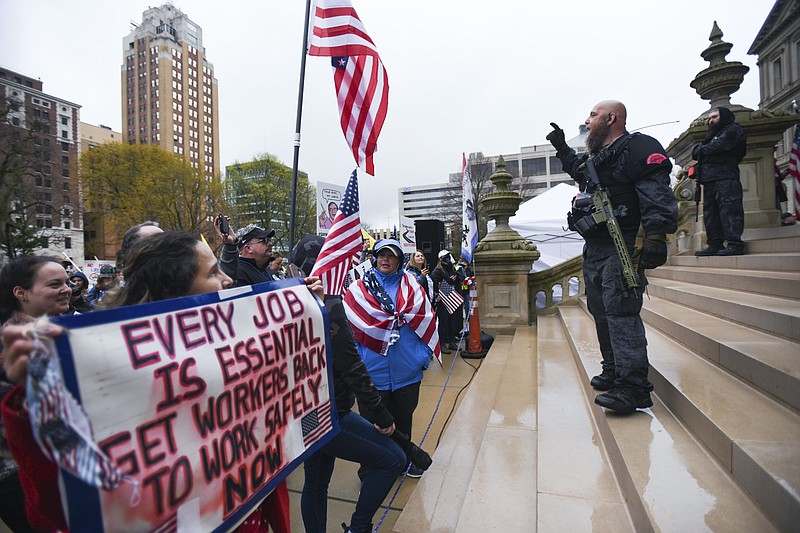Long before armed opponents of Michigan's quarantine marched on its state Capitol, a similarly vexatious problem landed on the desk of a newly inaugurated George Washington.
Americans have never liked being told what they can't do.
Today's protesters are angered by stay-at-home orders intended to curb the COVID-19 pandemic. Those who carried rifles in Washington's era resented a tax on whiskey instituted in 1791 to amortize the cost of the Revolutionary War.
It was anathema to farmers who found it more profitable to distill the grain they grew than to sell it or grind it into flour. The government insisted the tax was needed to pay off its debts.
That impasse triggered the Whiskey Rebellion, a bloody insurrection that Washington put down with federal troops. The confrontation revealed a psychological gap between the governors and the governed that is with us still.
To those who sit in halls of power, government's necessity is self-evident. Without it, how would roads get built and the country defended?
Many workaday Americans have a different take on government: At best, it's a necessary evil. Even better would be no government. The concept has been voiced in the White House no less than in neighborhood taverns.
"Government is not the solution to our problem, government is the problem," Ronald Reagan said, even as he assumed the highest office in the land.
Now let's be clear about those who have been protesting the nation's lockdown. Not all are motivated by ideology, which more often fills seminar rooms than picket lines.
Many protesters are patently hurt by paychecks lost when movie theaters and malls were compelled to close. The pandemic's impact has been felt differently by blue-collar and white-collar Americans.
Those who earn a living by peering into a computer have generally been able to take their job home. Sitting in my living room and writing this piece, I'm still on a payroll.
That opportunity hasn't been available to beauticians, barbers and bartenders. Even in restaurants open for takeout orders, cooks, hosts and servers have had their hours reduced.
Television nightly reveals the pained faces of proprietors closing the doors of small businesses invested with decades of sweat equity. They had followed a hallowed script: Work hard, save your money and build something of your own. Don't depend on others, least of all some bureaucrat.
I might carry a picket sign, too, if my share of the American dream had been shot down by a governor ordering my cash register closed when I have mortgage payments to make.
If I did so, some of the marchers I'd be among wouldn't be economically motivated. The anti-lockdown protests have been supported by anti-vaxers, opponents of required vaccination of children. Others are officeholders and candidates seeking to benefit from President Ronald Reagan's anti-government slogan.
That such diverse types could gather under the same banner shows how profoundly the American character has been shaped by the ideal of being left alone, each of us free to chart our destiny.
It was a desire nourished by geography. America's Western frontier seemed a refuge for restless types itching to live beyond the reach of sheriffs and legislatures. The reality wasn't so simple, but the myth was magnified by Hollywood. In the movies, pioneers and cowboys picked up and moved when cramped by newcomers.
That plot line wouldn't fill theater seats in ancient Athens. Shortly before the philosopher Socrates was executed, his disciples bribed the jailer. But Socrates vetoed their plan for him to escape to a district akin to our Wild West. To an urbane Greek, hiding in a wilderness wasn't a life worth living.
In this country, the federal government tacitly accepted its citizens' preference for it to keep its distance. Except during national emergencies - the Civil War and World War I - its functions were minimal. Running the postal system and collecting tariffs at port cities were pretty much it.
Then came successive super emergencies, the Great Depression and World War II. The government perforce became a goliath, and has remained so under Republican as well as Democratic control.
For the GOP that's meant constant promises to dismantle big government, none fulfilled. For Democrats it's meant tackling problems such as civil rights for racial and other minorities and affordable medical care for all, while fending off accusations that its reforms pave the way to a dictatorship.
That brings us to a present dilemma. Some say Big Brother's lockdown brought them to the point of being unable to feed their families. Others fear relaxing the regulations puts them in mortal danger, yet both groups are united in one respect.
All of our fates are in the hands of a presidential administration for which small government is gospel - even as it is confronted by a deadly disease with economic consequences the enormity of which beggars the imagination.
The Chicago Tribune
